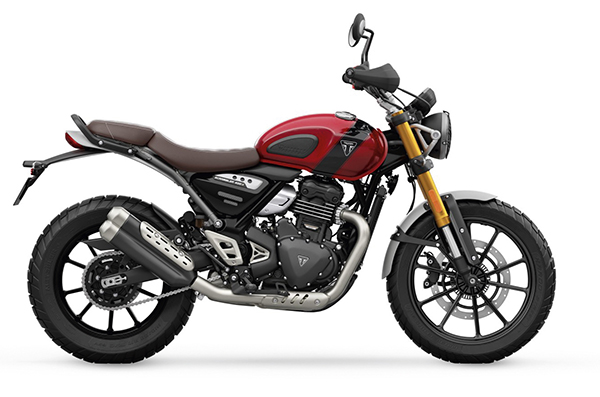400 cc Triumph Singles Mark New Era for British Brand By Ben Purvis
Since John Bloor took control of Triumph back in 1983, the company has manufactured bikes with two, three and four-cylinder engines, but these new 400 cc machines are the first single-cylinder models to reach production in the 40 years since he saved the brand.
The new Speed 400 and Scrambler 400 X are the fruit of Triumph's collaboration with India's Bajaj (also KTM's partner), and the hope will be to take on the likes of Royal Enfield for a substantial slice of the domestic Indian motorcycle market.
 |
| Scrambler 400 |
They're not simply Triumph-badged Bajaj machines, but clean-sheet designs that will be made in all Triumph's mass-production factories - three in Thailand, one in Brazil - as well as Bajaj's Indian plant, will be sold in all Triumph's global markets - presumably, including the United States.
Both models are built around the same platform, centered on a completely new single-cylinder engine. Despite the fins, the 398 cc single is water-cooled, with double overhead camshafts and four valves operated by finger-followers. There's a reverse-rotating balance shaft to keep it smooth and DLC internal coatings to reduce friction. The result is 29.4 kW (40 PS) at 8,000 rpm and 37.5 Nm of torque at 6,500 rpm.
Despite only a slight capacity advantage, the Triumph single makes around twice as much horsepower as Royal Enfield's 350 cc engine. The power goes through a slipper clutch to a six-speed transmission, and reaches the ground tamed by a switchable traction control.
"Speed 400 and Scrambler 400 X are the first results of Triumph-Bajaj venture"
The engine is mounted in a 'hybrid' frame that's part perimeter, part spine design, made of steel tubes and featuring a bolt-on subframe that will allow more varieties of bikes to be made from the same central building blocks - a classic modular approach.
At the bottom of the new single-cylinder range there's the Speed 400, which is designed to align with the Speed Twin 900 and 1200 models in Triumph's 'Modern Classics' line. Although the seat and tank are retro in shape, as is the simple, round headlight, the 43 mm USD forks and rear monoshock suspension are up-to-date, promising strong handling and putting the bike into the mix against more modern-looking rivals like KTM's 390 Duke (also built by Bajaj) and BMW's G310R, which is made in India by TVS.
 |
| Speed 400 |
There's a 1,380 mm wheelbase and 24.6-degree rake, plus 17-inch cast alloy wheels and Metzeler Sportec M9RR tires, all aligning to promise fun handling, while a low 790 mm seat means the Speed 400 is low enough for most riders to get their feet flat on the floor. Even with the 13-liter fuel tank filled, the bike weighs only 170 kg, so the single front brake, by Brembo's 'ByBre' sub-brand, should be enough to be effective.
On board, you get a combined analog and digital readout for all the main functions, plus a USB-C charging port.
The Scrambler 400 X takes the same main components and remixes them to fit in with Triumph's Scrambler range. The wheels are still alloys, but the front grows to 19 inches in diameter, and the frame is reworked with a 20 mm longer front section at the steering head and a revised, 23.2-degree rake. The suspension is similar to the Speed 400 but with longer travel, raising the seat to 835 mm. The same 'ByBre' front caliper grabs a 320 mm disc - up from 300 mm on the Speed 400 - to cope with the Scrambler 400 X's slightly increased 179 kg wet weight.
